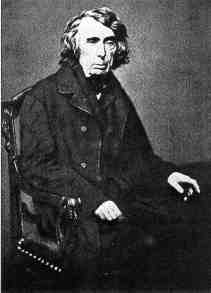
Two days after President Buchanan took over the presidency, March 6th, 1857, the first slavery-related controversy arose. Dred Scott (to the left) was a slave that had been taken with his master outside the state, to live in free territory for a short period of time. Upon his return to Missouri, Scott thought that his stay in Illinois had made him a free man, and that his slavery days were over. He sued the federal court for his freedom in 1854.
Thirteen years later, Chief Justice Taney had only found two reasons, but still ruled that Scott was still a slave. This sparked many controversies, but first let’s investigate the reason for this ruling. Firstly, Scott was a slave, and therefore not a US Citizen, which meant he actually had no right to sue the US court. Secondly, though, Chief Justice Taney (to the right) also stated that since slaves are property, it was unlawful to be deprived of property.

Other Justices disagreed, but it didn’t matter. Taney’s opinion would result in much higher tension between African Americans and slave owners. It set a precedent that many Northerners disagreed with, and would eventually lead to Civil War. This case intensified the slavery debate, more so than any other event, and Taney’s ruling became more then just a decision, it became a political act. His decision annulled all compromises about slavery issues, and put into question the authority of the Court.
Five years after the decision, Civil War broke out, and in 1865 the Thirteenth Amendment abolished slavery and essentially cancelled the Dred Scott decision.
The summary is comprehensive with the event, ruling, and the effects of the Dred Scott case. And I am impressed at the reasons of the decisions because these reasons are very controvresial although the law then supported them. However, I think a summary should be unbiased in anyway because summaries are piece of writings that is only based on facts. From what I perceive, the tone of this summary is against Chief Justice Taney's decision like "Other Justices disagreed, but it didn’t matter" when only two dissented.
ReplyDeletegreat summery. good facts, well writen, and well organized. the pictures were helpfull too. nice job.
ReplyDelete